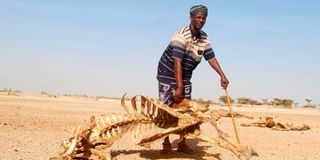Asal counties to cover locals against drought and floods

A herder holds a dried-out carcass in Horri Guda, North Horr, Marsabit County. Pastoralists in nothern Kenya are losing their herds to the devastating drought.
What you need to know:
- ARC is a specialised agency of the AU that supports governments across the continent build capacity.
- These plans will come as good news for Asal counties at a time when the frequency and severity of natural disasters have been worsening.
Arid counties in Kenya are planning to protect their residents from perennial droughts that have historically trapped families in vicious cycle of poverty through insurance, an African Union insurer has disclosed.
The African Risk Capacity (ARC) says it has been in talks with the Arid and Semi-Arid Lands (Asal) counties, which have expressed interest in taking up insurance on behalf of their residents.
ARC is a specialised agency of the AU that supports governments across the continent build capacity and provides insurance against natural and weather-related disasters.
These plans will come as good news for Asal counties at a time when the frequency and severity of natural disasters and other climate change-related events have been worsening, causing destruction and loss of livelihoods.

African Risk Capacity (ARC) chief executive officer Lesley Ndlovu at a media briefing at the Sarova Stanley Hotel on April 27, 2022.
“Our engagement with Asal counties is at the level of governors at their association so as to have political will and buying at the highest level. This is with all affected counties,” said ARC chief executive officer Lesley Ndlovu.
Mr Ndlovu told the Nation that while the agency was historically set up to support national governments, the uniqueness of county governments in Kenya made it possible to offer the services at the devolved level.
ARC basically assesses risks exposed to a particular area or country in terms of possibility of occurrence of natural disasters such as floods, drought, tropical cyclones and others, to offer insurance services.
The organisation deals with national governments, humanitarian organisations, sub-national governments and small and medium farmer groups.
According to ARC, Kenya and other East African countries have missed out on benefits they would get when droughts, floods, and other climate/weather-related disasters occur, by failing to insure their citizens.
Kenya had insured parts of the country prone to droughts at ARC between 2015 and 2017, but stopped paying premiums.
“Kenya at this point is not a member of the insurance pool even though at one point it was one of the main participants in ARC since inception. It has taken a decision not to participate at the macro level but we still work through the Kenya livestock insurance programme,” Mr Ndlovu said.
While indicating that the agency plans to raise the number of people protected against natural disasters from 30 million to 200 million across Africa by 2027, Mr Ndlovu urged the government to insure the country against the growing disasters, that have seen millions of Kenyans starve due to drought, with more losing their property to floods. Farmers have also lost crop to locusts and fall armyworm attacks.
“We know that in Kenya a few years ago we have had locust and fall armyworm attacks and the way we respond to that is by introducing other products in partnership with local players,” Mr Ndlovu said.
He said while some agencies and humanitarian organisations operating in the country have been insuring portions of the population that are vulnerable, absence of the national government had left a big gap that meant whenever a disaster occurs, the affected people go through unnecessary suffering.
The insurer says the magnitude of weather-related disasters in the country and across Africa has more than doubled and it estimates about Sh6 billion will be compensated to affected populations across the continent this year, nearly 60 per cent of total payouts it has made over the past decade.
Kenya will, however, miss out since it has not been an active member.

African Risk Capacity (ARC) chief executive officer Lesley Ndlovu at a media briefing at the Sarova Stanley Hotel on April 27, 2022.
ARC said that while it only protected droughts across the continent when it started, it has expanded to cover floods, crop attacks that result to poor yields by farmers and even epidemics such as the ongoing Covid-19.
“What we are proposing through ARC is a more proactive approach where the cost of natural disasters is pre-financed via insurance providing immediate liquidity to the government to be able to respond. In the case of drought, if you are able to intervene before the herders are forced to sell their livestock at rock bottom prices or to kill them for meat or take their children out of school to supplement family income then this is much better off as an approach than waiting until people are in the brink of starvation,” Mr Ndlovu said.
The CEO was selected to be part of the Young Global Leaders class of 2022, due to his role at ARC championing for insurance as a mitigation to effects of natural disasters.
“I am interested in mitigating the impact of climate change through insurance, we are witnessing an increasing frequency and severity of weather related natural disasters such as droughts, floods and tropical cyclones,” he said.





